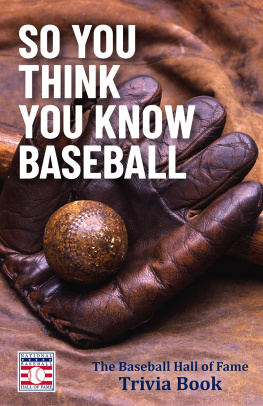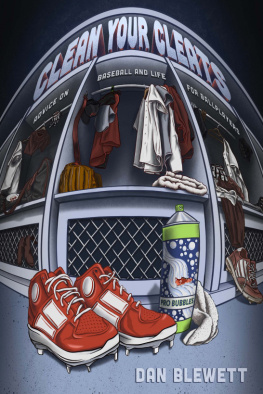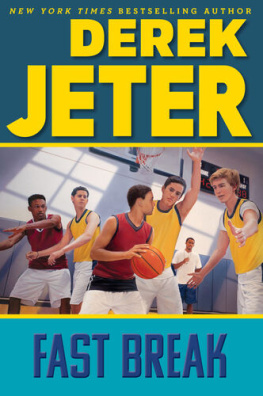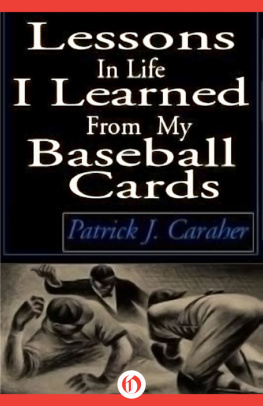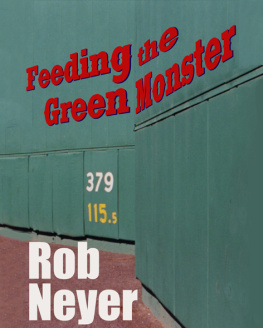



Simon & Schuster
1230 Avenue of the Americas
New York, NY 10020
www.SimonandSchuster.com
Copyright 2011 by Shawn Green
All rights reserved, including the right to reproduce this book or portions thereof in any form whatsoever. For information address Simon & Schuster Subsidiary Rights Department, 1230 Avenue of the Americas, New York, NY 10020.
First Simon & Schuster hardcover edition June 2011
SIMON & SCHUSTER and colophon are registered trademarks of Simon & Schuster, Inc.
The Simon & Schuster Speakers Bureau can bring authors to your live event. For more information or to book an event, contact the Simon & Schuster Speakers Bureau at 1-866-248-3049 or visit our website at www.simonspeakers.com .
Designed by Akasha Archer
Manufactured in the United States of America
10 9 8 7 6 5 4 3 2 1
Library of Congress Cataloging-in-Publication Data
Green, Shawn.
The way of baseball: finding stillness at 95 mph / Shawn Green,
Gordon McAlpine.
p. cm.
1. Green, Shawn. 2. Baseball playersUnited StatesBiography.
3. BaseballPhilosophy. I. McAlpine, Gordon. II. Title.
GV865.G67A3 2011
796.357092dc22
[B] 2010043438
ISBN 978-1-4391-9119-4
ISBN 978-1-4391-9121-7 (ebook)
To Lindsay, Presley, and Chandler:
The three loves of my life
CONTENTS
THE WAY OF
BASEBALL
STILLNESS
A s I walked from the on-deck circle to the batters box at Miller Park in the late afternoon of May 23, 2002, I couldnt help but wonder if I was about to get drilled by the next pitch. It was the ninth inning and I had already amassed five hits against the Milwaukee Brewers, including three home runsin their own ballpark. I wasnt so much worried about the pain of taking a fastball square in the back as I was curious as to how the day would turn out. Being this deep into the zone, I felt more like a spectator than a participant, watching my actions, rather than willing them. I had never had this kind of success in a single game, nor had I ever even seen anyone else achieve such heights, so I wasnt sure what the protocol was.
I dug my back foot into the batters box and went through my usual routine (I silently debated whether to take a pitch to see where the pitcher, Jose Cabrera, stood in terms of baseball etiquette). As I settled into my stance, I realized I was still too locked in to burden myself with thinking. Id simply look for my pitch and swing hard. The first pitch crossed the plate several inches outside; nonetheless, my body felt on time, as Id felt all day. Ball one. The next pitch was a changeup that I recognized but missed with my fiercest cut. Thered be no backing down this at-bat; I had a once in a lifetime shot at history. The 1-1 pitch was a fastball thigh-high on the inner part of the plate. My timing was perfect and an all-out swing sent my fourth and farthest home run of the day over the fence. Effortless! I was six for six with four home runs and nineteen total bases a Major League record.
Journeying around the bases, I relished the moment: a rare ovation from an opposing crowd and looks of amazement from the infielders as I trotted past. As I approached home plate, I made eye contact with a familiar face in the opposing dugout, Gary Matthews Sr., my former hitting coach. He gave me his characteristic military salute, for which hed long before earned his nickname, Sarge. For two years in Toronto, hed worked with me in batting cages across the American League, often four or more hours before game time. Now, Sarges salute was more than a mere acknowledgment of my record-setting performance. It was recognition for all the work Id invested over thousands of hours.
As I shook hands with my teammates and acknowledged the standing ovation of the crowd, I reflected on the past. The fruits of my labor here at Miller Park had grown from seeds planted five years earlier, before Sarge had even been hired by my first team, the Blue Jays. In those days, a conflict created a painful rift in my game, my future, my world: a rift that I now understood had created the necessary space for these fruitful seeds to have been planted in the first place, beneath the SkyDome in Toronto.
TORONTO 1997
After two years in the big leagues, Id already been labeled a slow starter. My hitting seemed to warm with the seasons, heating up in summer, so, along with most of the Blue Jays faithful, I suspected that 97 would be no different. In May, with springtime almost over, my hitting was indeed still as frigid as the Canadian air, but I wasnt panicked. June was on its way, July after that. Surely Id find my stroke. This year, however, I faced a new obstaclebeing benchedand my opportunities to heat up with the weather were seriously threatened.
Cito Gaston, our manager, had won two World Series and he was much loved by veteran players because of his loyalty to them, as well as his old-school attitudes. Cito viewed many younger players with suspicion. At twenty-four, Id already accumulated sufficient credentials to be an everyday player (AAA batting title in 94, voted among the top five American League rookies in 95, career average in the mid .280s), but Id never been given the chance. My rookie year with the Jays I hit .288 with 15 home runs on a last place team, yet I only got to play against right-handed pitchers. By mid-May of 97, Cito finally won out over the front office regarding my playing time. Suddenly, my career prospects were slipping away as I was forced to sit day after day in the dugout watching all the games from the so-called best seat in the house.
After weeks of frustration, I met with general manager Gord Ash and asked him to trade me so I could play somewhere, anywhere. A week or two passed, and every day new trade rumors with my name attached floated around the league until at last Cito had to address it.
It was midafternoon at the Toronto SkyDome, four hours before a night game against the Yankees. Id put on my uniform and was walking past Citos open office door when he called, Hey, Green, come in here and have a seat. I want to talk to you.
My heart thumped as I approached my bosss desk and sat down.
Look, Shawn, dont think that I dont like you, cause I do, Cito said. I think you have a lot of potential, but He stopped, considering, maybe searching out a rationale for benching me. You need to improve your defense. No manager is going to chance it with you the way you play in the field.
I began to squirm in my seat. My first couple of years Id played scared in right field because, each time I erred, I couldnt help focusing on the irritation on Citos face. Still, my defense was improving (within two years Id win the leagues Gold Glove Award, though obviously I didnt possess this evidence for the defense at the time).
Also, Shawn, you need to learn how to pull the ball to hit more home runs because you dont run well enough to steal bases, Cito continued.
How do you know I cant steal bases if you never give me the green light to try? I snapped. And as for pulling the ball, I know how to turn on the inside pitch.
For a left-handed-batter, pulling the ball means connecting with the pitch early and hitting to right field, increasing the chance of a home run. There was nothing I liked more than pulling the ball with power, but I knew that limiting myself to being a dead-pull hitter would reduce my productivity.
Next page

